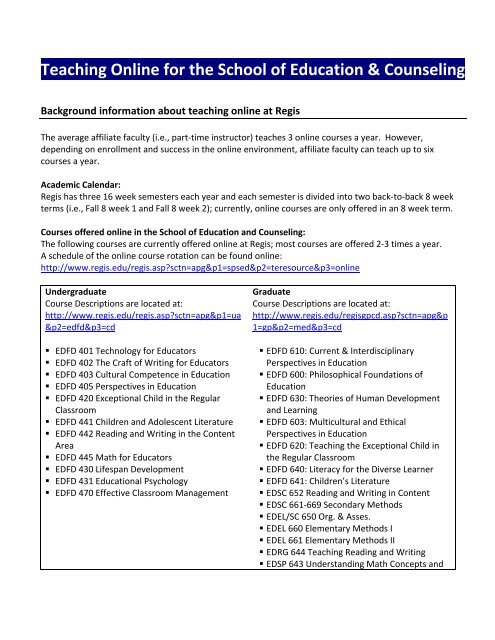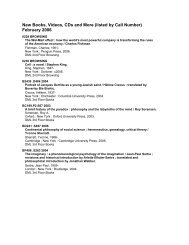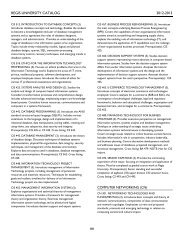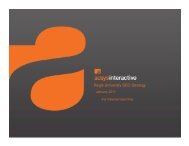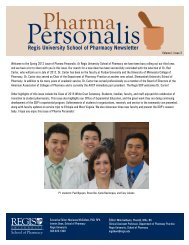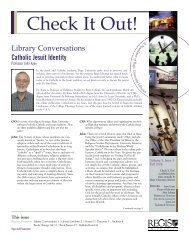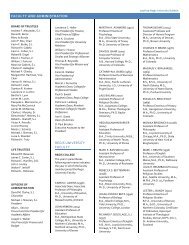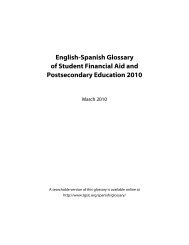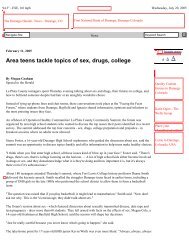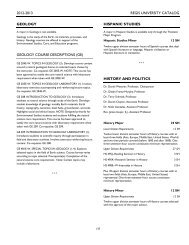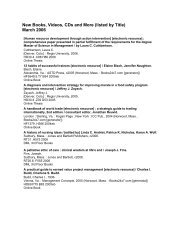Teaching Online for the School of Education ... - Regis University
Teaching Online for the School of Education ... - Regis University
Teaching Online for the School of Education ... - Regis University
Create successful ePaper yourself
Turn your PDF publications into a flip-book with our unique Google optimized e-Paper software.
<strong>Teaching</strong> <strong>Online</strong> <strong>for</strong> <strong>the</strong> <strong>School</strong> <strong>of</strong> <strong>Education</strong> & Counseling<br />
Background in<strong>for</strong>mation about teaching online at <strong>Regis</strong><br />
The average affiliate faculty (i.e., part‐time instructor) teaches 3 online courses a year. However,<br />
depending on enrollment and success in <strong>the</strong> online environment, affiliate faculty can teach up to six<br />
courses a year.<br />
Academic Calendar:<br />
<strong>Regis</strong> has three 16 week semesters each year and each semester is divided into two back‐to‐back 8 week<br />
terms (i.e., Fall 8 week 1 and Fall 8 week 2); currently, online courses are only <strong>of</strong>fered in an 8 week term.<br />
Courses <strong>of</strong>fered online in <strong>the</strong> <strong>School</strong> <strong>of</strong> <strong>Education</strong> and Counseling:<br />
The following courses are currently <strong>of</strong>fered online at <strong>Regis</strong>; most courses are <strong>of</strong>fered 2‐3 times a year.<br />
A schedule <strong>of</strong> <strong>the</strong> online course rotation can be found online:<br />
http://www.regis.edu/regis.asp?sctn=apg&p1=spsed&p2=teresource&p3=online<br />
Undergraduate<br />
Course Descriptions are located at:<br />
http://www.regis.edu/regis.asp?sctn=apg&p1=ua<br />
&p2=edfd&p3=cd<br />
� EDFD 401 Technology <strong>for</strong> Educators<br />
� EDFD 402 The Craft <strong>of</strong> Writing <strong>for</strong> Educators<br />
� EDFD 403 Cultural Competence in <strong>Education</strong><br />
� EDFD 405 Perspectives in <strong>Education</strong><br />
� EDFD 420 Exceptional Child in <strong>the</strong> Regular<br />
Classroom<br />
� EDFD 441 Children and Adolescent Literature<br />
� EDFD 442 Reading and Writing in <strong>the</strong> Content<br />
Area<br />
� EDFD 445 Math <strong>for</strong> Educators<br />
� EDFD 430 Lifespan Development<br />
� EDFD 431 <strong>Education</strong>al Psychology<br />
� EDFD 470 Effective Classroom Management<br />
Graduate<br />
Course Descriptions are located at:<br />
http://www.regis.edu/regisgpcd.asp?sctn=apg&p<br />
1=gp&p2=med&p3=cd<br />
� EDFD 610: Current & Interdisciplinary<br />
Perspectives in <strong>Education</strong><br />
� EDFD 600: Philosophical Foundations <strong>of</strong><br />
<strong>Education</strong><br />
� EDFD 630: Theories <strong>of</strong> Human Development<br />
and Learning<br />
� EDFD 603: Multicultural and Ethical<br />
Perspectives in <strong>Education</strong><br />
� EDFD 620: <strong>Teaching</strong> <strong>the</strong> Exceptional Child in<br />
<strong>the</strong> Regular Classroom<br />
� EDFD 640: Literacy <strong>for</strong> <strong>the</strong> Diverse Learner<br />
� EDFD 641: Children’s Literature<br />
� EDSC 652 Reading and Writing in Content<br />
� EDSC 661‐669 Secondary Methods<br />
� EDEL/SC 650 Org. & Asses.<br />
� EDEL 660 Elementary Methods I<br />
� EDEL 661 Elementary Methods II<br />
� EDRG 644 <strong>Teaching</strong> Reading and Writing<br />
� EDSP 643 Understanding Math Concepts and
Instruction<br />
� EDLS 670 Introduction to educational<br />
leadership<br />
� EDLS 671 Instructional strategies<br />
� EDLS 682 Curriculum content<br />
� EDLS 684 Curriculum, Evaluation, design,<br />
selection, & implementation<br />
� EDLS 685 Peer mentoring and support<br />
� EDLS 680 school law and finance<br />
� EDLS 681 personnel selection and supervision<br />
� EDLS 683 things <strong>the</strong>y never teach you<br />
� EDLS 686 Advanced Assessment<br />
� EDTC 600: Introduction to <strong>Education</strong>al<br />
Technology<br />
� EDTC 602: Instructional Design<br />
� EDTC 614 Integrating technology into <strong>the</strong><br />
curriculum<br />
� EDTC 615 Per<strong>for</strong>mance Improvement<br />
� EDTC 616 Designing & developing web‐based lrng<br />
� EDTC 617 Dev & eval multimedia <strong>for</strong> learning<br />
Typical Students:<br />
Our typical student is a teacher preparation student. The majority (perhaps 75%) <strong>of</strong> our students are<br />
seeking an initial Colorado or Wyoming teaching license. However, we also have students completing a<br />
M.Ed. in areas like Administrative Leadership (possibly with a Colorado or Wyoming Principal License),<br />
Curriculum/Instruction/Assessment, and Instructional Technology.<br />
Faculty Contracts:<br />
Affiliate faculty are compensated per student when <strong>the</strong>y teach online; currently <strong>the</strong> rate is $165 per<br />
student. Our courses are capped at 15 students; our average course has about 8‐12 students in it.<br />
However, we will <strong>of</strong>ten <strong>of</strong>fer a course with as little as 5 students to avoid canceling it. There<strong>for</strong>e, currently,<br />
online faculty can get paid anywhere from $825 to $2475 depending on how many students are enrolled in<br />
<strong>the</strong> course.<br />
Qualifications to Teach <strong>Online</strong>:<br />
In addition to successfully passing <strong>the</strong> online assessment (which will be addressed below), faculty must<br />
demonstrate that <strong>the</strong>y have <strong>the</strong> content knowledge (i.e., course work, degrees,<br />
licenses/endorsements/certifications) as well as pr<strong>of</strong>essional experience (i.e., experience working in <strong>the</strong><br />
field or area related to individual courses) related to any and all courses <strong>the</strong>y want to teach.<br />
All courses require at least a Master’s degree in education or a related field; EDFD 600, 610, 603, and 630<br />
require a doctorate. Generally speaking, most “EDFD” courses require K12 teaching experience and most<br />
“EDLS” courses require experience as a teacher leader, a principal, or an administrator. You are expected to<br />
have at least three courses in <strong>the</strong> subject area and at least two courses related to subject area (i.e., <strong>for</strong> a
total <strong>of</strong> 15 credits) to be qualified to teach any given course. We will qualify you to teach specific courses<br />
once you have passed <strong>the</strong> online assessment / orientation and submitted your paperwork.<br />
<strong>Online</strong> Assessment, Orientation, & Internship<br />
All faculty (even our full time faculty or affiliate faculty who have completed a ground‐based assessment to<br />
teach in a face‐to‐face classroom) must complete a 3 week long assessment / training / orientation /<br />
internship be<strong>for</strong>e <strong>the</strong>y can teach online at <strong>Regis</strong>. The assessment and orientation are conducted online<br />
within <strong>the</strong> WorldClass Course Management System to ensure a relevant and au<strong>the</strong>ntic learning experience.<br />
<strong>Online</strong> Assessment:<br />
The online assessment is <strong>of</strong>fered six times a year; however, <strong>the</strong> <strong>School</strong> <strong>of</strong> <strong>Education</strong> and Counseling tends<br />
to only have prospective faculty take part 1‐3 times a year, depending on need.<br />
The purpose <strong>of</strong> <strong>Regis</strong>' faculty assessment and selection processes are to insure that our facilitators possess<br />
<strong>the</strong> appropriate skills that will insure success in <strong>the</strong> online learning environment. These include, but are not<br />
limited to:<br />
• The ability to integrate personal and student experiences and knowledge into <strong>the</strong> learning<br />
experience.<br />
• The ability to write and speak effectively and persuasively.<br />
• The ability to provide constructive and developmental feedback.<br />
• The ability to work with o<strong>the</strong>rs and facilitate group processes in an electronic <strong>for</strong>mat.<br />
Please be aware that <strong>the</strong> online assessment is a very time intensive so you need to set aside approximately<br />
1‐2 hours each day <strong>for</strong> <strong>the</strong> entire three weeks to complete <strong>the</strong> work. The first part—which we call <strong>the</strong><br />
assessment—lasts one week. Upon successful completion <strong>of</strong> <strong>the</strong> assessment you will be begin <strong>the</strong> online<br />
orientation.<br />
<strong>Online</strong> Orientation:<br />
The online orientation (<strong>of</strong>ten called <strong>the</strong> TOP class) usually begins 1‐2 weeks after <strong>the</strong> online<br />
assessment. The online orientation is an opportunity <strong>for</strong> interdisciplinary collaboration in which we<br />
introduce pedagogical in<strong>for</strong>mation about facilitating online courses. This two week training is online as well<br />
and provides participants <strong>the</strong> opportunity to hone skills in such areas as managing online courses, setting<br />
and communicating expectations, facilitating online discussions, building online community, etc.. There are<br />
some additional tasks that take place during this time as well.<br />
Internship:<br />
Historically <strong>the</strong> <strong>School</strong> <strong>of</strong> <strong>Education</strong> and Counseling did not require new faculty to take part in an internship<br />
be<strong>for</strong>e <strong>the</strong>y teach online. In <strong>the</strong> past, though, o<strong>the</strong>r schools have required new faculty to essentially
“shadow” an exemplary online instructor, as a type <strong>of</strong> internship, <strong>for</strong> 8 weeks be<strong>for</strong>e teaching <strong>the</strong>ir own<br />
course online.<br />
In an ef<strong>for</strong>t to maintain consistency across all <strong>the</strong> schools in <strong>the</strong> College <strong>for</strong> Pr<strong>of</strong>essional Studies, it is<br />
looking like we will begin requiring some type <strong>of</strong> internship some time in <strong>the</strong> future. At this time, I do not<br />
know when this new requirement will begin (i.e., you might not be required to complete an internship) or<br />
what <strong>the</strong> internship might look like.<br />
Apply to Teach <strong>Online</strong><br />
Given all <strong>of</strong> <strong>the</strong> in<strong>for</strong>mation above, if you are still interested in teaching online and you are not a current<br />
full‐time or affiliate faculty member at <strong>Regis</strong>, you should send a letter <strong>of</strong> interest—highlighting your<br />
background—and a resume or CV to Kathi Werner at kwerner@regis.edu. Kathi will complete an initial<br />
screening and <strong>the</strong>n <strong>for</strong>ward your in<strong>for</strong>mation to <strong>the</strong> coordinator <strong>of</strong> online programs in <strong>the</strong> <strong>School</strong> <strong>of</strong><br />
<strong>Education</strong> and Counseling (which is currently Patrick Lowenthal, plowenth@regis.edu). Patrick will decide if<br />
your background meets our current needs. Keep in mind that we receive requests to teach online<br />
throughout <strong>the</strong> year from faculty all over <strong>the</strong> country. Be<strong>for</strong>e inviting you to take part in <strong>the</strong> online<br />
assessment and orientation, Patrick will schedule a phone interview. Once you complete <strong>the</strong> phone<br />
interview, you will be invited to take part in <strong>the</strong> next online assessment (which could be 3‐6 months away).<br />
After Completing <strong>the</strong> <strong>Online</strong> Assessment and Orientation<br />
After you successfully complete <strong>the</strong> online assessment and orientation (and <strong>the</strong> internship if applicable),<br />
you will need to complete <strong>the</strong> following steps be<strong>for</strong>e you can teach your first course online.<br />
1. Paperwork<br />
You must complete some paperwork be<strong>for</strong>e you can teach online. Currently, you would contact Kathi<br />
Werner (kwerner@regis.edu) and send in such things as <strong>of</strong>ficial transcripts and copies <strong>of</strong> ID’s, I‐9....<br />
2. <strong>Regis</strong>.Net Account<br />
After your paperwork is complete, you will <strong>of</strong>ficially be entered in <strong>the</strong> <strong>Regis</strong> system and able to request<br />
a <strong>Regis</strong>.Net account.<br />
All new faculty and students are required to get a <strong>Regis</strong>.Net account.<br />
A <strong>Regis</strong>.Net account gives you access to <strong>the</strong> following:<br />
• WorldClass: http://worldclass.regis.edu<br />
WorldClass is <strong>the</strong> Learning Management System used <strong>for</strong> online courses. Faculty can access courses<br />
<strong>the</strong>y are scheduled to teach two weeks be<strong>for</strong>e <strong>the</strong> term starts. Students can access courses <strong>the</strong>y<br />
are taking <strong>the</strong> Friday or Saturday be<strong>for</strong>e <strong>the</strong> term starts.<br />
• WebAdvisor: http://webadvisor.regis.edu<br />
WebAdvisor is an online tool that allows student’s access to a host <strong>of</strong> student services (e.g., register<br />
<strong>for</strong> courses, pay <strong>for</strong> courses) and faculty access to tools such as online grading and teaching<br />
preferences.
• InSite: http://insite.regis.edu<br />
InSite gives faculty and students access to <strong>the</strong> <strong>Regis</strong> <strong>University</strong> Portal (also called SharePoint). Once<br />
faculty and students login to InSite, <strong>the</strong>y can access <strong>the</strong>ir personal “My Space”, <strong>the</strong>ir network drive<br />
space, and <strong>the</strong>ir email.<br />
• Email: http://email.regis.edu<br />
You can also access your email directly.<br />
All <strong>Regis</strong> faculty and students are required to have and to use a regis.edu email. Your <strong>Regis</strong> email is<br />
set up automatically when you request a <strong>Regis</strong>.Net account. Faculty emails tend to be set up with a<br />
first initial and <strong>the</strong> first seven letters <strong>of</strong> your last name. For example, Patrick Lowenthal’s email is<br />
plowenth@regis.edu. Student emails tend to consist <strong>of</strong> letters <strong>of</strong> <strong>the</strong>ir name and <strong>the</strong>ir student id.<br />
To get a <strong>Regis</strong>.Net account, go to http://webadvisor.regis.edu and click on “Faculty” and <strong>the</strong>n<br />
“request a reqis.net account”<br />
Note: If you have problems, contact our ITS department at 303.458.4050 or its@regis.edu<br />
3. Course Preferences<br />
Faculty are assigned to teach online courses 4‐6 months be<strong>for</strong>e any given term. Faculty are assigned to<br />
teach courses <strong>for</strong> a given semester (i.e., both 8 week 1 and 8 week 2) at <strong>the</strong> same time. To be<br />
considered to teach online, faculty must enter <strong>the</strong>ir teaching preferences into WebAdvisor <strong>for</strong> <strong>the</strong> given<br />
semester / terms in question. Faculty are sent an email to remind <strong>the</strong>m when <strong>the</strong>y should be entering<br />
in <strong>the</strong>ir teaching preferences.<br />
Some instructions to help you through this process are available online:<br />
http://www.regis.edu/regis.asp?sctn=facst&p1=res&p2=ins<br />
Once this is complete, <strong>the</strong> list <strong>of</strong> teaching preferences is sent to <strong>the</strong> coordinator <strong>of</strong> online programs and<br />
he/she will assign faculty to specific courses based on <strong>the</strong>ir qualification and past teaching evaluations.<br />
If you have any questions about this document or teaching online in <strong>the</strong> <strong>School</strong> <strong>of</strong> <strong>Education</strong> and<br />
Counseling, please contact Patrick Lowenthal at plowenth@regis.edu


